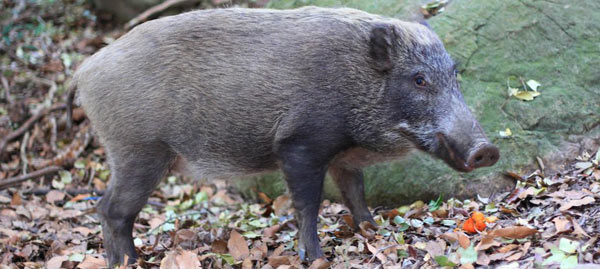正文
福岛放射性野猪泛滥成灾
From mutated insects and broken-down rescue robots, to cobweb-infested schools that haven’t been touched in years, the Fukushima evacuation zone - the site of one of the worst disasters of the 21st century - is showing no signs of regaining even a semblance of habitability... for humans, at least.
基因突变的昆虫、损毁的救援机器人、学校里层层密布的蜘蛛网……多年都无人问津,没有任何迹象表明经历了21世纪最严重灾难的福岛无人区还可以居住,至少,对人类来说不可以。
Wild boars are reportedly thriving in the evacuated areas around the Fukushima Daiichi Nuclear Power Plant, which experienced multiple meltdowns following an earthquake-triggered tsunami back in 2011. And now they’re tearing through nearby farmlands, causing more than US$900,000 (¥98 million) in crop damage for local farmers.
2011年,一场地震引发的海啸导致福岛第一核电站发生多次核反应堆堆芯熔毁事故,而现在那片核灾区野猪泛滥。它们毁坏附近的农田,给当地农民造成了90多万美元(约合9800万日元)的损失。
How did things get so bad? Well, under normal circumstances, this boar population would be kept under control by local hunters, with The Japan Times calling pork - including wild boar meat - "the nation’s most popular meat".
事情怎么会变成这样呢?其实,在正常情况下,当地猎人可以控制野猪数量。《日本时报》称,猪肉,包括野猪肉,是“日本最受欢迎的肉类”。

But the problem is these wild boars have been contaminated with caesium-137 - a radioactive substance with a half-life of 30 years - from eating plants and small animals around the exclusion zone, and now the hunters won’t go near them.
但问题是,由于这些野猪吃的是无人区的植物和小动物,它们已经被一种半衰期有30年的放射性物质铯137污染了。
"Wild boar, along with raccoon, have been taking advantage of the evacuation zone, entering vacant houses in areas damaged by the [disaster], and using them as breeding places or burrows," assistant ecology professor Okuda Keitokunin at the Fukushima University Environmental Radioactivity Institute told the local press.
福岛大学环境放射研究院生态学助理教授Okuda Keitokunin对当地媒体说:“野猪、浣熊趁着疏散区没有人,搬进了空房子里,在那里繁殖居住。”
Now reproducing with abandon in the exclusion zones, the wild boar population has increased 300 percent since the disaster, from around 3,000 to 13,000, and they’re spilling out into the nearby farms to tear up and trample the crops.
如今,野猪在无人区里自由繁殖,数量已经增长了300%,从3000头变成了13000头,它们还冲进附近的农场,糟蹋庄稼。
And local authorities are running out of ideas for how to contain the rampaging force of radioactive boars, as Travis Andrews at The Washington Post reports:
而且当地政府对怎样制止这群狂暴的放射性野猪也束手无策。《华盛顿邮报》记者特拉维斯•安德鲁斯报道称:
"These animals are unfit for human consumption, which presents another problem: hunters can attempt to reduce the population, but they have to do something with the carcasses. According to Texas A&M wildlife and fisheries professor Billy Higginbotham, the average size of a male hog is around 200 pounds (90 kg).
“这些动物不宜为人类消费,这又有另外一个问题:猎人可以减少野猪数量,但他们还得处理野猪尸体。德克萨斯农工大学野生生物和渔业科学教授比利•希金博特姆教授说,雄性野猪的平均重量约有200磅(约90公斤)。
Considering this average, if 13,000 are killed, hunters have around 2,600,000 pounds (1,179,340 kg) of potentially dangerous flesh requiring disposal."
按这个平均数字计算,如果猎人捕杀了一万三千头野猪,他们就要处理260万磅(约117.9万公斤)有潜在危险的猪肉。”
The hunters have been dumping the radioactive boar carcasses in three designated mass graves in the nearby city of Nihonmatsu, but they’re only big enough to hold about 600 of these sizeable creatures, and they’re filling up fast.
在附近的二本松市,猎人们已经在三个指定的填尸场填埋有放射性的野猪尸体了,但这些地方大概只能容纳600具这么大的动物,而且很快就会填满。
"Sooner or later, we’re going to have to ask local people to give us their land to use," Tsuneo Saito, a local boar hunter, told The Sunday Times. "The city doesn’t own land which isn’t occupied by houses."
当地一名野猪猎户Tsuneo Saito对《星期日泰晤士报》说:“我们迟早都会请求本地居民把土地给我们用,城市的土地都盖满了房子。”
The most logical solution once these mass graves are filled to the brim is incinerating the rest of the radioactive carcasses, but you can’t just burn contaminated flesh - you need a special facility that’s capable of filtering out the radioactive materials so they’re not redistributed across the land via smoke particles.
最合理的解决办法就是,一旦这些填尸场堆满,就焚烧剩下的放射性尸体,但不能仅仅烧掉这些被污染了的肉,还需要可以过滤掉放射性物质的特殊设备,防止它们随烟飘到其它地方去。
Andrews reports that a facility like this exists in the nearby city of Soma, but "it can only handle three boars a day (or 21 a week, which is only 1,092 each year; not quite 13,000)," he says.
据安德鲁斯报道,像这样的设施只有附近的相马市才有,但“它一天只能处理三头野猪(一周21头,一年才只有1092头,与13000头还差得很远)”。
So far, this is as close to a solution as the local farmers, hunters, and authorities have been able to get.
目前,这已经是当地农民、猎人、政府当局所能想到的最好办法了。
While nuclear meltdowns are tragic events for us humans, leading to a loss of life, homes, and livelihoods for so many people, many species of wildlife have shown incredible resilience in places humans fear to tread.
尽管核事故是人类的不幸,很多人因此失去生计、生命、背井离乡,但很多种野生动物的数量却在这片人类害怕涉足的土地上猛烈反弹。
As we reported back in October, populations of elks, deer, wolves, bears, lynx, and boars are thriving in the Chernobyl exclusion zone decades after the devastating meltdown, simply due to a lack of human interference. Sarah Kaplan reported for The Washington Post that some of these populations have more than doubled in recent years.
10月份我们报道了一篇文章,几十年前切尔诺贝利核电站发生了毁灭性的事故,而现在,由于没有人类干扰,鹿、狼、熊、山猫和野猪都在那里迅速繁殖。《华盛顿邮报》的记者莎拉•卡普兰说,有些品种的数量近几年翻了一番不止。
"That wildlife started increasing when humans abandoned the area in 1986 is not earth-shattering news," radio-ecology expert Tom Hinton from Fukushima University told her. "What’s surprising here was the life was able to increase even in an area that is among the most radioactively contaminated in the world."
“1986年人们撤离切尔诺贝利后野生动物的数量就一直在增长,这并不是什么骇人听闻的消息,”福岛大学放射生态学专家汤姆•辛顿对她说,“令人震惊的是即使在世界上放射性污染最严重的地区,生命还能如此快速繁殖。”
Meanwhile, radioactive boars aren't the only thing local authorities in Fukushima are having to deal with. There's a whole lot of contaminated water still leaking out of the power plant, and no one's quite sure how to get rid of the radioactive tritium they're extracting from it.
同时,放射性的野猪并不是福岛政府当局唯一要处理的事。还有大量被污染的水从核电站泄露出去,没有人确切知道该怎样处理从里面提取出来的放射性物质氚。
One thing's for sure - humanity has never seen a disaster quite like this, and we've still got many years to go before this nightmare is over for the people trying to live in the area. All we can do is hope that science can come through with some answers.
但有一点是肯定的——人类从来没有经历过这样的灾难,我们还要花很多年来解决在这片土地上居住的问题,结束这场噩梦。我们能做的只有祈祷科学可以快快找到答案。
Vocabulary
mutate: 突变
boar: 野猪;(未阉的)公猪
half-life: [核] 半衰期
burrow: 地洞,穴;藏身处;住处
carcass: (人或动物的)尸体;残骸
lynx: 山猫




 手机网站
手机网站